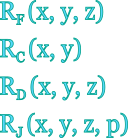Jump to
Table of Contents
Share this
Carlson's Elliptic Integrals
This tool evaluates the Carlson's symmetric form of elliptic integrals: RF(x,y,z), RC(x,y), RD(x,y,z) and RJ(x,y,z,p). Arguments x, y, z should be generally non-negative, but more restrictions apply. Argument p should be non-zero. Enter the arguments below.
x = | |||
y = | |||
z = | |||
p = | |||
Result: | |||
RF (x,y,z) = | |||
RC (x,y) = | |||
RD (x,y,z) = | |||
RJ (x,y,z,p) = | |||
 |
ADVERTISEMENT
Table of Contents
Share this
About Carlson's symmetric form of Elliptic Integrals
Definitions
The Carlson's symmetric form of the elliptic integral of the first kind is defined as:
The Carlson's degenerate elliptic integral of the first kind, with y=z, is defined as:
The Carlson's symmetric form of the elliptic integral of the second kind is defined as:
The Carlson's symmetric form of the elliptic integral of the third kind is defined as: